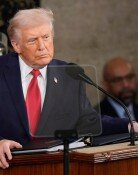U.S. appoints new Ambassador to S. Korea amid N. Korea’s multiple provocations
U.S. appoints new Ambassador to S. Korea amid N. Korea’s multiple provocations
Posted January. 28, 2022 07:57,
Updated January. 28, 2022 07:57
North Korea launched two projectiles suspected to be short-range ballistic missiles to the East Sea on Thursday. The projectiles are thought to be launched from the new large-caliber multiple rocket launcher. This is the sixth time the country has launched missiles this year and it has been two days since its launch of a cruise missile.
U.S. President Joe Biden decided to appoint U.S. Ambassador to Colombia Philip Goldberg as the U.S. Ambassador to South Korea, which has remained vacant for over a year, and asked for the South Korean government’s agreement. The ambassador had served as Coordinator for Implementation of U.N. Sanctions on North Korea and an assistant secretary of State for Intelligence and Research (INR).
It is unusual that North Korea launched multiple rockets in a short period of time – once every four days on average this year. The country showed off its sophisticated nuclear and missile power by launching hypersonic missiles and multiple types of missiles equipped with evasion flight and mass hitting power. Its intention must be to come between South Korea and the U.S. and put pressure on the U.S. to change its attitude by showing off its presence while the U.S. is focused on competition with China and Russia, and South Korea is distracted with an upcoming presidential election.
The U.S. is reinforcing its principle-based response stance to North Korea. The U.S. condemned the North’s violation of the U.N. resolutions and called for the country to return to a dialogue table. At the same time, it is repeatedly sending a warning message that patience is running out. Unlike the Barack Obama administration’s appointment of a pro-Korean diplomat and the Donald Trump administration’s appointment of a figure with a military background, the current U.S. administration named a veteran diplomat who knows well about sanctions against North Korea, which shows the administration’s principle-based approach, rather than flexibility.
This is why recent cyber attacks against North Korea are garnering attention. The North Korean Ministry of Foreign Affairs, Rodong Sinmun, Air Koryo, and other major institutions went down on January 14 and Wednesday. Experts believe that it is likely to be caused by external DDoS attack, rather than internal issues. In 2014, North Korea’s internet network went down due to the U.S.’s DDoS attack after the North hacked Sony Pictures and the U.S. announced a ‘proportional response.’
North Korea’s series of provocations are turning the previous stance of dialogue and diplomacy first to the stance of sanctions and pressure, rather than encouraging the U.S. to make concessions for the North. The U.S. is already pursuing independent sanctions against the North as well as sanctions with the U.N. Even if the U.N. sanctions become nullified by opposition from China and Russia, the U.S. will strengthen the sanctions network with its allies to put more pressure on North Korea. The Kim Jong Un regime is struggling with concerns about being abandoned by China at any point and the voices of starving residents. It won’t be able to last long.






![‘부화방탕 대명사’ 북한 2인자 최룡해의 퇴장 [주성하의 ‘北토크’]](https://dimg.donga.com/c/138/175/90/1/wps/NEWS/IMAGE/2026/02/27/133414028.1.jpg)
